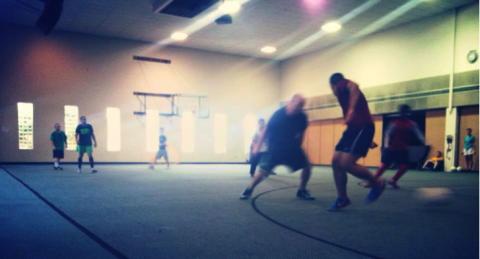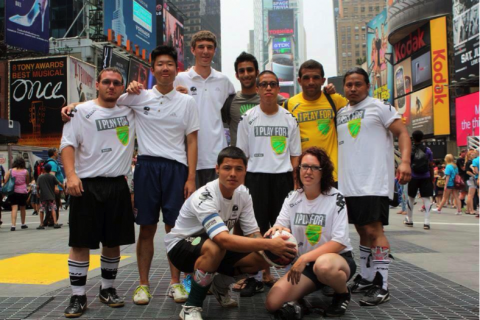Recent Blog Posts
Editor's Note:
While the Housing Alliance focuses on creating opportunities for safe, healthy, affordable homes for all residents of Washington, the other part of our vision includes making sure these homes are in thriving communities. And one important component for a thriving community is access to recreation, exercise, and sports! We devote some blog space to recent Seattle University graduate Ashwin Warrior. We first met him through our work with the Seattle University Project on Family Homelessness. During his time in Seattle, Ashwin coached for Street Soccer Seattle and has this contribution to our blog.
Guest Blogger: Ashwin Warrior

Weekly Seattle Street Soccer practice at University Presbyterian Church's Larson Hall
Walk past University Presbyterian Church in Seattle’s U-District on a Thursday evening, and you may need to watch your step. Errant soccer balls have been known to shoot out the open doors of Larson Hall unexpectedly and find their way to the sidewalk.
Don’t be alarmed.
You’ve come across the training ground for Street Soccer Seattle, a nonprofit using the sport of soccer to empower homeless youth and young adults. Each week, a group of coaches and players come together to practice, committing to two hours of non-stop hard work and leaving everything on the field.
Street Soccer Seattle was founded with the belief that homelessness is a symptom of the breakdown of community. If stable sources of food and shelter are the essential needs to help a young person begin the process of moving beyond homelessness, then a supportive community is the key to ensuring they stay on track.
Make no mistake, Street Soccer is about so much more than kicking a ball. For the past five years, the organization has strived to provide a space for at-risk youth to leave the “at-risk” moniker behind. At the end of each practice, the team gathers to share highs and lows from the week and ways they can support one another. Outside of practice, coaches serve as informal mentors, organizing meetings with players to set and achieve goals both on and off the field.
Team member Aaron* credits the program with helping him get his life back on track. “Before Street Soccer, I was in emergency shelters, one-night shelters. I got into [Street Soccer], and I found myself housing. I graduated high school and then went on to a year of college and a six month internship…I’ve gotten a lot of friends though Street Soccer and mentors and people who help me along this very difficult road in my life. I really needed that. I really doubt I’d be where I am without them.”
Today, Aaron works in IT, but still remains actively involved with Street Soccer as a coach, sharing his wisdom and experience with new players.
Street Soccer runs on these sorts of relationships; the organization is completely staffed by volunteers. The coaches are not caseworkers. But they are experts at building trust with youth and are ready to refer players to organizations that fit their needs. The relationships built are a small but integral part of the larger continuum of care for homeless youth in Washington State and are a reminder of the significant impact one individual can have on another.
The impact is not lost on Seattle team member, Eddie. “I love playing soccer, I love this team…All the coaches support us all the way. They are more than just coaches. They call us to see how we are. They care about our lives and our success.”
This year, Eddie was part of the Street Soccer team that traveled to the Street Soccer USA Cup, an annual tournament hosted in New York City that brings together hundreds of homeless and formerly homeless athletes from 22 programs scattered across the country.
The tournament is partly a competition, but largely a celebration of everything the players have achieved in their lives over the past year.
This year, Eddie had much to celebrate. Over the course of the year, in addition to sticking with the program and being named team captain, Eddie progressed through his studies, maintained an independent living situation, and made great strides toward stable employment. In recognition of his achievements, Street Soccer USA nominated Eddie to represent the United States at the Homeless World Cup in Poland. He now works full time, but still makes room in his schedule to attend practices on his days off.
I first encountered Street Soccer after watching Kicking It, a documentary about the Homeless World Cup. I played the sport throughout my life, and was looking for a new outlet for my passion. Street Soccer Seattle was a natural choice, and I loved that it kept building relationships with youth at its core. I was hooked and spent over three years volunteering in various capacities for the organization.
In the end, Street Soccer is about coming together as a team, working hard for each other on the court, taking joy in the game, and slowly erasing the many boundaries we put between one another. As David Nibley, a founding member of the program put it, “Sometimes we also, through poverty, shut people out of our culture. And soccer is a huge part of the Seattle culture, so we want them to feel a part of society through playing. It’s a really powerful way to help people feel less marginalized.”
As a completely volunteer-run organization, Street Soccer Seattle is always looking for donations and volunteer help. You can find out more at www.streetsoccerseattle.org, by liking the team on Facebook, or by sending an email to info-at-streetsoccerseattle-dot-org.
*All last names of Street Soccer Seattle participants were withheld by request.

Street Soccer Seattle players and coaches at the Stret Soccer USA Cup Finals at New York City's Time Square.
Eddie is holding the ball, bottom left. Author in the back middle.


Add new comment